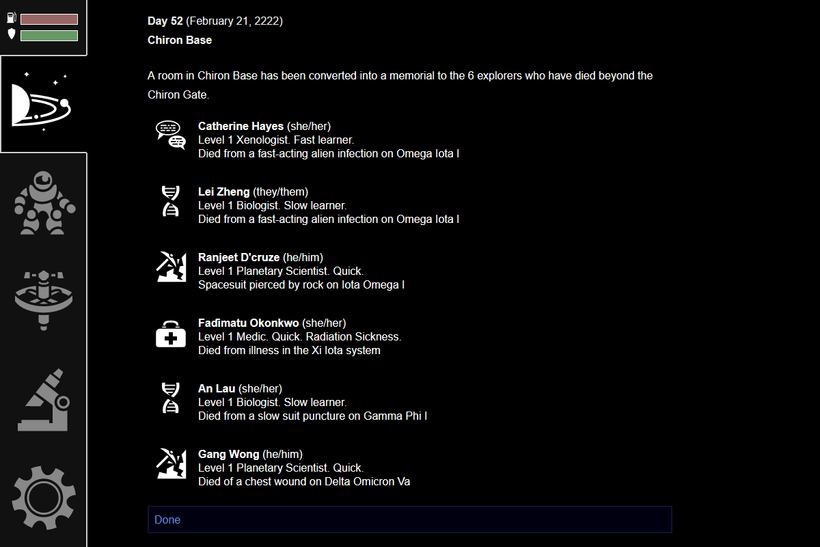Beyond the Chiron Gate continues to come together. The main thing I’ve added this month is a new injury system and some events that tie in to it.
New Injury System
Crew members no longer have abstract health points. Instead, event outcomes in which they suffer an accident now trigger a second event about dealing with the wound and/or the damage to their spacesuit. The Medic and Engineer classes are useful for resolving these events (for injuries and suit damage respectively).
For example, on a planet with the Craggy and Unstable traits you might get the Avalanche event, which can end with one of your crew members being hit by fallen rocks. The game then picks a random event from the EVA Injury table, for example the Slow Suit Puncture event. If you have an Engineer, you can have them try to repair the suit; if they fail, the explorers rush back to the ship and it’s up to your Medic to stop the injured crew member dying of hypoxia.
Crew members who suffer an accident may or may not be able to help themselves. An Engineer can patch their own spacesuit, but if your only Medic is the one who passes out from hypoxia, your other crew members will have to do what they can with a first aid kit.
An injured crew member might recover, die, or end up on Life Support. Life Support means that they’re out of action for the rest of the current star system but will recover when you next return to Chiron Base.
The new injury system means the game is more brutal and random than previously. You can no longer assume that a crew member with full health will probably be fine: any crew member might go from perfectly healthy to dead within the space of a few passages. However, crew members are less likely to die as your crew levels up, since they’re more likely to pass the skill checks required to save one another.
(I’m considering making Life Support a ship upgrade rather than something you start with. The ability to save a crew member who would otherwise die is something you’ll want more as your crew members get higher-level, as higher-level crew members are more useful and represent a greater investment of XP.)
The game ends when all crew members are dead or on life support. If you have only one crew member left, a lot of events that would be survivable become immediately fatal (e.g. there’s an event where someone falls into a crevasse and has to be pulled up by the other crew members; if there’s no one left to pull them up, it’s game over). If most of the crew is dead then it’s safest to head back to base…but you can’t return to a star system once you’ve left, so if there’s a planet you want to finish exploring then you might be tempted to risk it. (At least that’s the idea; I’ll need to carefully balance the game to keep the risk-vs-reward interesting.)
Chiron Base now has a memorial to all the intrepid space explorers you’ve gotten killed.

Other changes
As well as events triggering when you land on a planet, I’ve added another set of events that trigger when you travel between planets in a system. I’ve also added star system traits which determine which of these events can trigger (e.g. a system might be crowded with minor asteroids, which adds the chance of getting an asteroid collision event whenever you travel).
The game still doesn’t include alien civilisations, but the universe generator will now place alien plants and animals on planets with the appropriate temperature and atmosphere.
Finally I’m experimenting with having consumable resources which let you succeed on a check if you don’t have an appropriately skilled character. The current build of the game includes “suit sealant tubes” which let you repair a suit breach without an engineer, and I can use the system to add similar resources. I’m not sure about this mechanic, though, so I might take it out again.
That’s all for now. I think I’ve got a good working rhythm on the game at the moment so I should hopefully have some more progress to report at the end of August!
